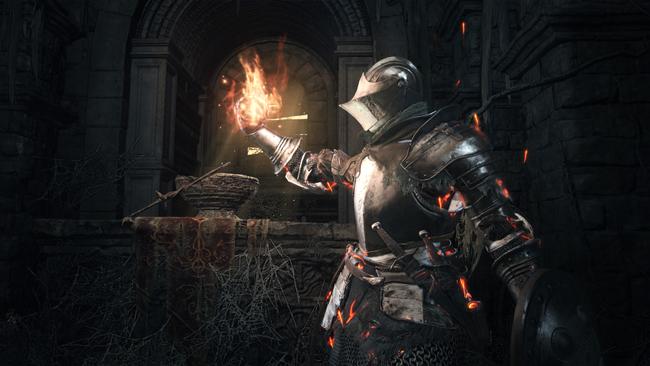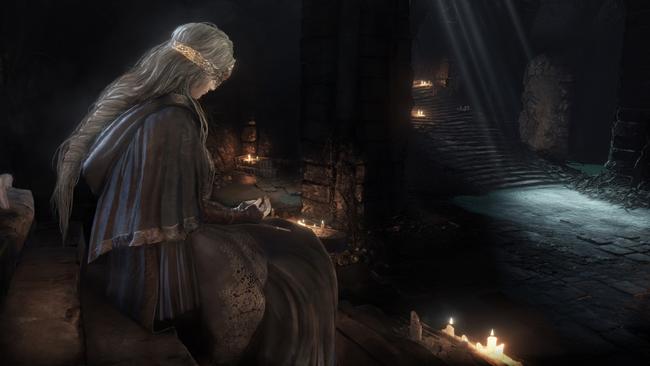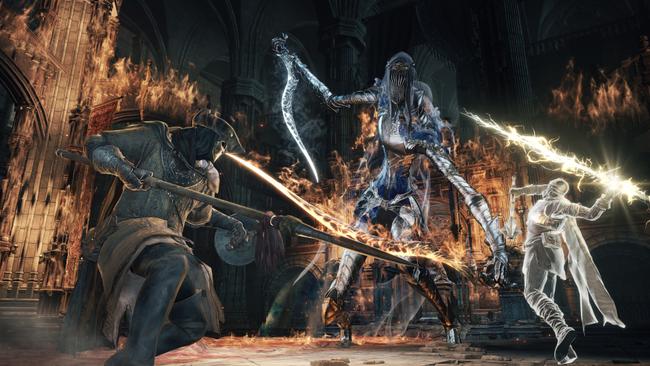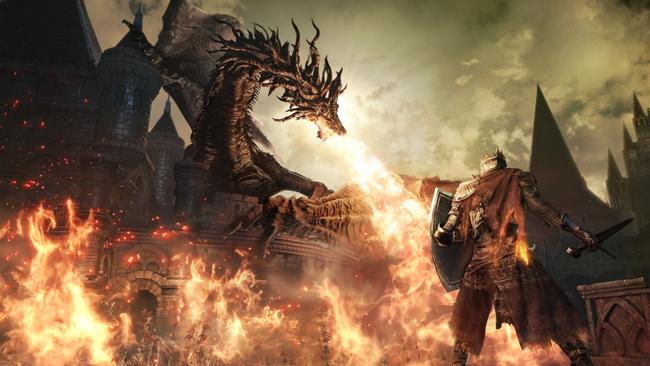
Dark Souls 3 Review
The fire fades, and only embers remain. For the third time, From Software asks us to have our fill of estus and death. Dark Souls 3 is here, and it carries with it a tremendous heap of expectations. People are eager to see how the series will bounce back after the somewhat lukewarm reception to the second game, and see how the series can compete with its sister series Bloodborne. Dark Souls 3 has the most refined gameplay mechanics in series history, contains the fewest weak points out of any previous game, and will remind you of all the reasons why Dark Souls became adored the world over.
Right off the bat I'm going to address the question of "Can you play Dark Souls 3 if you have not played any of the others?" Technically yes you can, but by and large this is a game for the fans. You won't get the most out of it unless you have some knowledge of what happened in Dark Souls 1's story, and if you play this game first, it will probably be harder to go back to the previous entries due to how refined this one is. So really, you should play the first game at least before jumping into Dark Souls 3.

Note: In this next section I'm going to talk briefly about the plot, but I will avoid major spoilers and be vague about the details.
Dark Souls 3 takes place in the transient land of Lorthic, where all of the kingdoms where the fire was linked converge. Something is threatening the current fire link, and the Lords Of Cinder have risen from their graves to safeguard it. Your goal in the game is to defeat these lords and set right what is wrong with the world. For anyone that's played the original Dark Souls, this is going to immediately all sound very familiar. The story once again revolves around the first flame, and it probably should in a Dark Souls game to a degree, but I can't help but feel the general plot is too derivative of that of the first game. Dark Souls 2's overarching plot as about linking the fire as well, but Nashandra's manipulation of the player made it feel like a unique experience nonetheless - not so much in Dark Souls 3's case.
The game does have some plot threads that are totally fresh to the franchise, but I feel like a couple of them are left unresolved in favor of plot elements meant to incite nostalgia in long-time fans. Dark Souls 3's plot is too much like that of the first game for it's own good, and takes away from its own personality at times. The new antagonists of this game have to live up to the likes of Gwyn, The Witch Of Izalith, Nito, Seath, and Manus. This is a tall order when they are fulfilling very similar roles to the lords of the first game. When it comes to the narrative, Dark Souls 3 often just made me appreciate the first game more. That tends to happen when storytellers purposefully tick away at nostalgic checkboxes. There is no use reminding us how good Dark Souls 1 was, because that game already exists and we already know how good it is.
Thankfully though the world itself is much more fleshed out than ever before. If you are a fan of intricacies of an item's history, or detailed backstories of the inhabitants of the world then Dark Souls 3 should have you digging through its lore for many hours. There are even several answers to long standing mysteries of the series, my favorite being the origin of a particular character from Dark Souls 1 (but I will let you figure out who it is of your own accord). The series has a a reputation for rich worlds, and Dark Souls 3 happily lives up to its namesake in that regard.

Being the 5th game in the 'Soulsborne' legacy, this one has without a doubt the best mechanical foundation of the series. The combat builds upon what was introduced in the first two games, but ever so slightly increases the pace of the combat as well. You can now change stances with the added weapon arts system to chain together and create much faster and interesting combos, but should you use them, switching back and fourth between a shield becomes more difficult. Furthermore they added an actual charge attack similar to what was in Bloodborne. These additions may sound small but they really elevate the already excellent mechanics of the Souls games to new heights. Balancing your stamina meter with these new techniques creates a satisfying ebb and flow to battle. They also added a new "Ash Estus" system as a new resource to manage in combat. Should you choose to play as a magic user, you will have a limited mana pool and you'll have to drink from your Ash Estus to replenish it. Magic no longer auto regenerates with your stamina meter like the first two Dark Souls games. I played as a basic knight character and did not use any magic or ranged weapons so I cannot speak to either system well.
Nothing brings out the best of Souls combat like a good boss fight, and I am happy to say Dark Souls 3 probably has the best collection of bosses in the entire series. Despite the fact that this is the 5th entry in its lineage, there's no sign of creativity being stifled. I won't give away the details of course because boss fights are part of what makes these games great; just know that you're in for one amazing boss after the other in this game. There was not a single encounter I disliked, which has never happened to me in this series before. My only gripe is that it feels like several of them have much smaller health pools than they should, as some of them go down much sooner than I would have liked.
Probably my favorite change to the gameplay is the introduction of the ember system. The repercussions of death are handled in a much more interesting way than in the previous games. When you die in Dark Souls 3, you lose your 'ember form' and as a result, one-fourth of your health bar is removed. You also opt out of the online systems with this and cannot summon for co-op or take part in Player Vs Player combat. To restore your ember form, you have to use an item called an ember; embers can be found throughout the world and bought from certain NPCs. You can also restore ember form by defeating bosses. Once your embers are restored, your health bar will fully recover and you will be able to use the various online systems. This basically functions exactly like the spirit form from Demon's Souls. It is a far more elegant and well thought out mechanic than the undead form of the previous games.

Before I move away from the topic of gameplay, it is time to address the elephant in the room: difficulty. There has been a lot of murmuring about this game and how it is easier than previous titles. I think the truth of the matter though is Dark Souls 3 really isn't any easier than prior games, but more that it being the 5th 'Soulsborne', fans are far more accustomed to how these things play out. It is far more challenging to trick the player into making them feel dread when we have already experienced hundreds of hours of this song and dance already. Dark Souls 3 might be a *tad* easier than Dark Souls 1 or Bloodborne on paper, but it gave me a tougher fight than Dark Souls 2 ever did. Really though, the hardest game in the series is whichever one you play first.
A topic of much concern to the Dark Souls fanbase is always linearity and level design. The anxiety generally stems from Dark Souls 2 which was undeniably the most restrictive in terms of how free and open the game was, with the levels rarely looping back in on themselves. The world in that game was not well thought out and did not fit together logically. Dark Souls 3 however is up there with Dark Souls 1 or Bloodborne for having rich, vertical levels filled with hidden content. Every zone is brimming with various paths you can take, sometimes to the point where I was unable to decide which road to travel down next. The order in which you tackle the Lords Of Cinder is fairly open as well. In my playthrough I fought the Abyss Watchers, Aldrich, and Yhorm in that order. Prior to release I was a little worried about the ability to warp from bonfire to bonfire, thinking it would result in sloppy level design we saw in Dark Souls 2 or the later half of Dark Souls 1. Thankfully I can report this is not the case and the ability to warp to different locations saves you a good deal of unnecessary travel time without hurting the level design. Environments in Dark Souls 3 are immaculately designed and bridge together in very clever ways.
Dark Souls has several legacies the franchise has been come to be known for over the years, and unfortunately one of them is poor performance. I was playing the PC version of the game for this review, and 95% of the time it ran at a flawless 60FPS at 1080P resolution. However there are two areas in the game that hammer the framerate for whatever reason. While Dark Souls 3 is a graphically pleasing experience, especially on max settings, it really shouldn't struggle ever on a machine with a GTX 970 and 16GB of memory. Thankfully the PC version is filled to the brim with a lot of graphical options you can adjust accordingly. I did not get a chance for see how it faired on consoles, but from what I understand the PS4 and Xbox One struggle to maintain 30FPS at times. Visually the game is very beautiful, and is even a step up from Bloodborne last year in terms of texture work, volumetric fog, and lighting. However there's no reason why From Software hasn't addressed these sort of concerns more closely in Dark Souls 3. This has been a complaint from critics and fans alike since Demon's Souls all the way back in 2009.

For the majority of this review, I have been heaping praise at Dark Souls 3 like there was no tomorrow. It is probably the best playing, most refined game in the 'Soulsborne'' series and contains the least amount of flaws. The only trouble is Dark Souls 3 plays it a bit too safe and does not do enough new things. I mentioned earlier that the story and plot cater to nostalgia to the point where I consider it a detriment. The game takes it even further than that where entire entire areas are a tip of the cap to prior entries as well.
It plays like a love letter to the fans who have been playing these games since Demon's Souls. While that is not inherently a bad thing, and I even like it when having that part of my brain tickled every so often too, experience has taught me it hurts games (and other media) on repeat viewings. A good example is The Legend Of Zelda series' own Twilight Princess: it's a fantastic game, but it cared more about being a tribute to Ocarina Of Time than being its own unique experience. Dark Souls 3 never quite hits Twilight Princess levels of nostalgia coddling, but it comes close. It is possible that this was a response to the criticism Dark Souls 2 received where a lot of fans felt it was too far from what made the original Dark Souls great, but we will never know for sure. Make no mistake - this is an absolutely brilliant game and a top tier example of great game design. I just wish it was more concerned with being a great sequel to Dark Souls rather than a tribute to it.
Dark Souls 3 oozes loving detail at every seam, and is at the very height of craftsmanship in the action RPG genre. Sometimes it is too poised at being more of a greatest hits album of the franchise than a proper sequel, but maybe that was the intent. From Software knows how dearly fans love this series, and they have reciprocated that love tenfold with this game. Dark Souls taught us that nothing lasts forever. From the largest star to the smallest bonfire, sooner or later every fire fizzles out. For now at least, it is time to bid farewell to this franchise, and Dark Souls 3 is as wonderful a send off as any we could have hoped for.